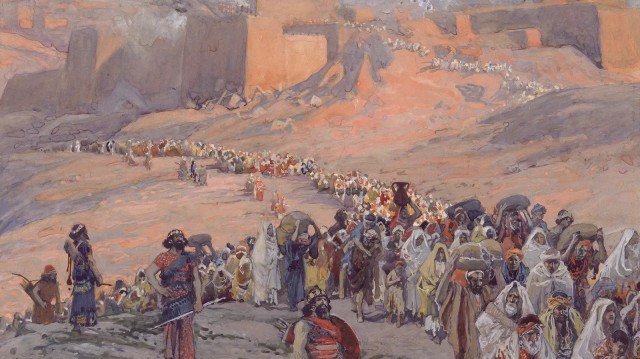
Biblical archaeology served political goals, not scientific neutrality, researcher argues
Archaeological and historical evidence contradicts the Zionist narrative of a “greater Jewish kingdom” and “promised land” in historical Palestine – key claims used to justify Israeli sovereignty over the territory, according to a scholar and expert on the period.
Abdulrezzak Matani, a scholar of Palestinian heritage and archaeology, told Anadolu that no credible archaeological data confirms the existence of a united Israelite kingdom under David and Solomon in Jerusalem or its surrounding areas, as depicted in The Torah, the Hebrew bible.
“The Torah account has often been used to legitimize settler-colonial policies and assert control over land,” he said. “In doing so, the Arab and Islamic heritage has frequently been ignored or deliberately erased.”
According to Matani, the biblical claim that a powerful and united Israelite kingdom ruled by David and Solomon once stretched from the Nile to the Euphrates is a central pillar of Zionist ideology. But he said more than a century of excavations in Jerusalem and surrounding areas have failed to uncover evidence – such as monumental architecture or inscriptions – to confirm the existence of such a kingdom.
“Most archaeological finds in the area belong to later periods or to other civilizations, including the Canaanites, Romans, Byzantines, and Islamic dynasties,” Matani said.
He added that in the 10th century BCE – the period in which the biblical kingdom is said to have existed – Jerusalem was a small, walled settlement, far from being the capital city of a vast empire. Even in the “City of David” area, no structures linked to David or Solomon have been found.
Many Israeli and Western archaeologists have also questioned the dating of findings and the assumption that they relate to biblical figures, arguing that such claims often rest on ideological interpretations rather than evidence.
“Even if a kingdom existed, it was likely a small tribal entity – not a regional power,” said Matani. “Scientific and impartial archaeological assessments do not provide strong or conclusive evidence for the existence of a unified Israelite kingdom under David and Solomon.”
- Biblical narrative used to build nationalist identity
According to Matani, the biblical kingdom narrative likely emerged during or after the Babylonian exile and was shaped to preserve a scattered community's identity.
He said the narrative took on a political function with the emergence of the Zionist movement in the late 19th and early 20th centuries.
“Palestine was presented as the ‘promised land' and the ‘land of the ancestors,' helping to construct a shared national identity among diaspora Jews. Biblical archaeology was never a neutral science – it was used from the start to reinforce Zionist claims and erase the Arab-Islamic presence.”
Matani emphasized that religious belief deserves respect, but using biblical stories to justify territorial claims, settlements, or statehood raises serious concerns.
“The Torah narrative is a part of Jewish religious heritage, and should be respected as such. But turning it into a political and ideological weapon to deny other peoples' rights is deeply problematic.”
He concluded that the claim of a united Israelite kingdom in ancient Palestine blends religious myth with modern political goals – and that the lack of archaeological evidence only strengthens the argument for separating belief from historical fact.







